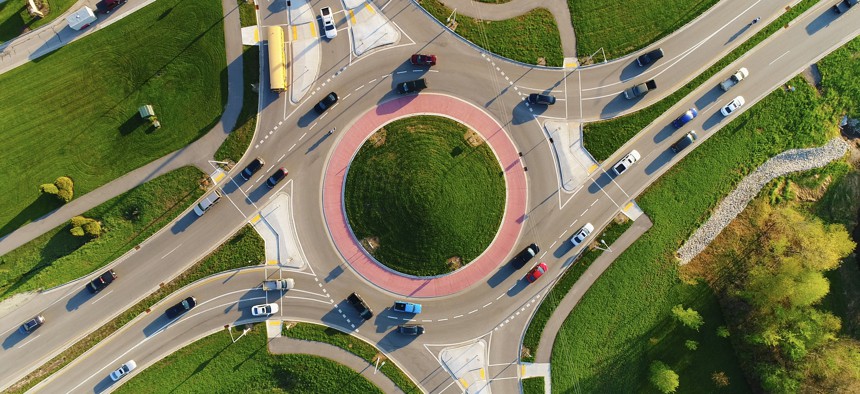Connecting state and local government leaders
COMMENTARY | An alternative to traditional signalized intersections, roundabouts can substantially offset the dangers posed by larger vehicles, ensuring that any potential impact is less severe due to moderated speeds and oblique angles of collision.
As a nation, the U.S. seems unable to shake its love affair with massive cars, a trend that has only intensified with each new generation of vehicles. In 2022, 80% of all new cars sold in the U.S. were SUVs and trucks—a trend that shows no sign of slowing. By 2027, the SUV market is projected to grow from a current level of $886 billion to $1.2 trillion.
There's a clear economic rationale behind this trend: Larger vehicles, while not much more expensive to produce, command a significantly higher sale price. But while they may offer a protective cocoon to their occupants, their larger size poses an increased risk to other road users. Sadly, the rise of bigger, heavier and more powerful vehicles has been accompanied by an alarming rise in fatalities.
Here's where roundabouts can play a major role. Roundabouts, or traffic circles, send vehicles in a single direction around a central island. They can substantially offset the dangers posed by larger vehicles, ensuring that any potential impact is less severe due to moderated speeds and oblique angles of collision.
The Roundabout: One Method to Prevent Fatalities
Roundabouts present an innovative alternative to traditional signalized intersections, offering several safety and operational advantages. One of their most significant benefits is a reduction in potential conflict points, meaning vehicles have fewer opportunities to collide. This feature, combined with the inevitable slowdown of vehicles entering and navigating the roundabout, allows drivers more reaction time, potentially minimizing the severity of accidents.
The roundabout design ensures a one-way traffic flow, eliminating high-speed, right-angle collisions common at signalized junctions. The continuous movement of vehicles, meanwhile, reduces the likelihood of rear-end collisions. When accidents do occur, they typically involve indirect angles of impact, leading to fewer severe injuries and property damage. Roundabouts also eliminate the possibility of red-light running, a dangerous behavior that can result in high-speed T-bone collisions.
Beyond safety, roundabouts enhance traffic flow. Off-peak hours especially benefit from smoother traffic flows, minimizing congestion and gridlock risks. There is one exception, though. Where there are significant pedestrian movements, such as in highly populated, walkable urban areas, roundabouts are not encouraged.
In terms of general safety for road users, studies cited by the Insurance Institute for Highway Safety have shown that roundabouts reduce total crashes by more than 62% and injuries by a whopping 87%. In 2021, 24% of all U.S. crash deaths, equating to 10,445 individuals, occurred at intersections. The same year, an estimated 127,000 injuries were attributed to red-light running crashes.
Despite their significant safety and efficiency benefits, the U.S. is far behind its European counterparts in adopting roundabouts. The U.K. alone has 25,000 roundabouts, while France and Spain boast more than 30,000 each. That stands in stark contrast to the 10,000 in the U.S.
The Need for State and Local Government Involvement
With three-quarters of the U.S. road network under the stewardship of local governance, the onus is squarely on state and local entities to improve road safety standards. Some have been proactive, setting ambitious Vision Zero targets—a global strategy aiming to eliminate all traffic-related fatalities and severe injuries. The journey has been challenging, however, with the pressures on local transportation departments often leading to a troubling preference for congestion alleviation over safety.
In 2000, Washington state pioneered the adoption of the Vision Zero, emphasizing high-visibility enforcement and engineering to decelerate traffic speeds, and states such as Minnesota and Maryland followed suit. Washington also legislated the Complete Streets program, mandating its principles of planning, designing and building safe streets for all users, for projects over $500,000. Florida recognized a similar policy in 2014, though its adoption isn't uniform across the state.
Despite such initiatives, there has been no substantial decrease in traffic fatalities. Rather than prioritizing safety, many state transportation departments focus on construction. According to the American Road and Transportation Builders Association, states committed $36.4 billion in highway and bridge formula funds from the Infrastructure Investment & Jobs Act to support more than 24,000 new projects through July 31, 2023. This is in addition to $53.5 billion in investment and over 29,000 new projects supported in FY 2022. Nearly half of those projects (46%) were for repair or reconstruction work, while an additional 21% of funds were used for adding capacity, such as a new lane or major widening, to an existing roadway. Only 1% was designated for bike and pedestrian facilities.
It's a predicament I've emphasized repeatedly: The objectives of safety, capacity and congestion alleviation are often incompatible. Elevating safety invariably mandates speed reduction. Regrettably, under various pressures, many local transportation departments lean toward choices that alleviate congestion at the expense of safety, particularly at intersections.
Despite some hesitation, the U.S. is more often considering roundabouts, adding 500-700 in each of the past 15 years. States such as New York and Virginia have adopted roundabout-first policies.
It’s time for comprehensive planning, design and driver education to align with the broader aim of Vision Zero. Only through this alignment can the full potential of roundabouts be realized. We must translate this vision into tangible action, ensuring safer roads for everyone. The question that remains: Are we ready to make this vision a reality?
Wes Guckert is president and CEO of The Traffic Group, a service-disabled veteran-owned small business, Maryland-based traffic engineering and transportation planning firm.

NEXT STORY: Legacy programs stymie Biden's efforts to boost equity in infrastructure spending



